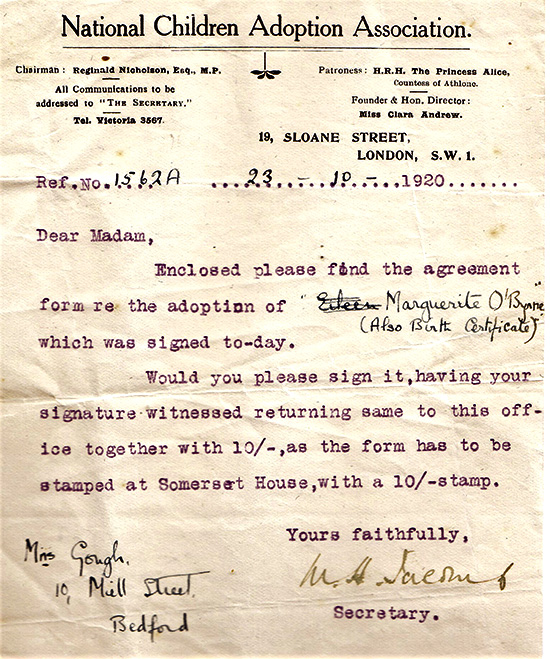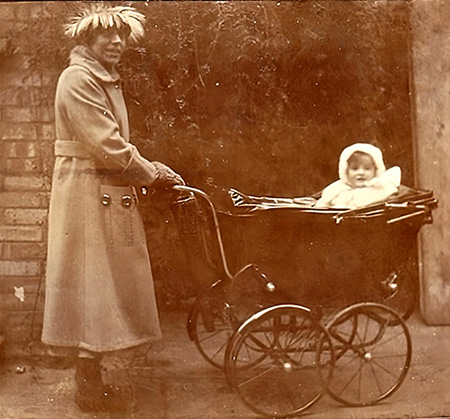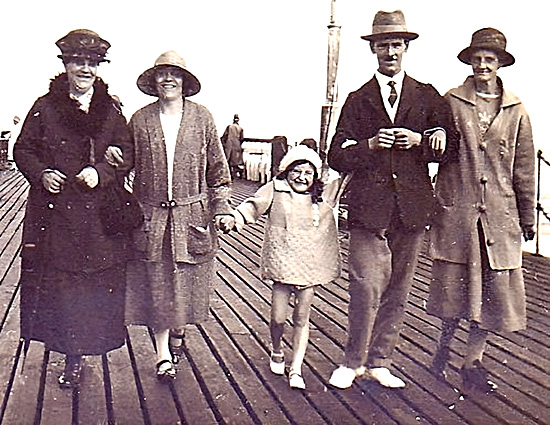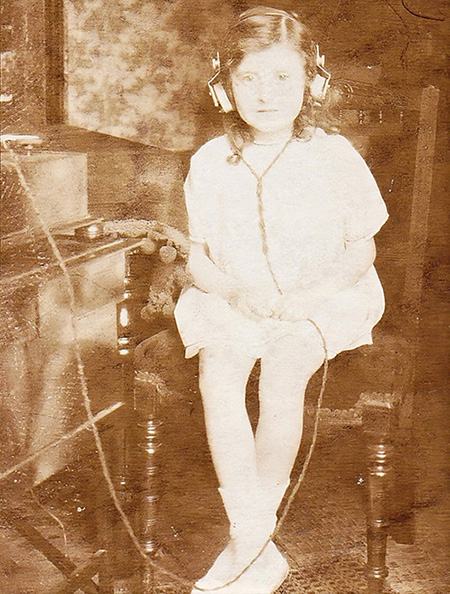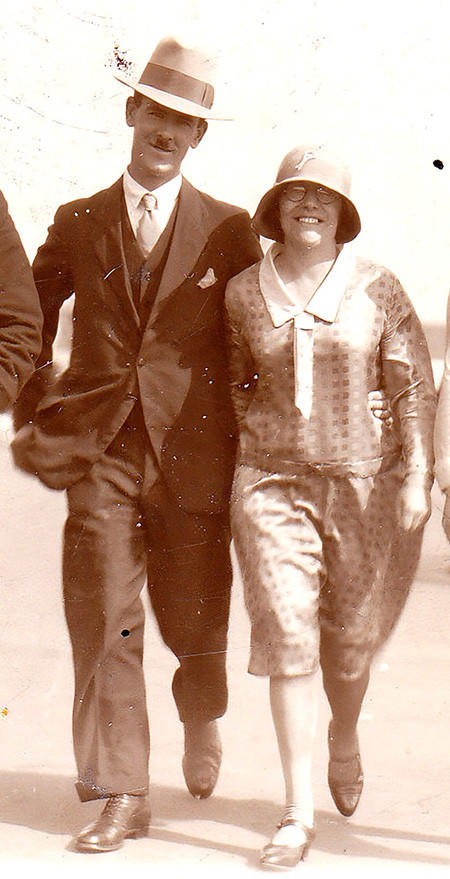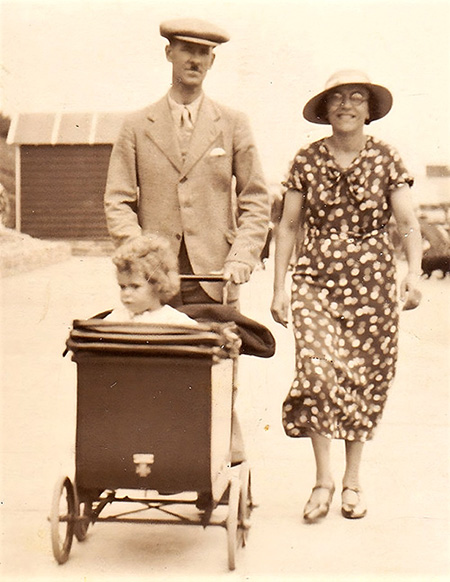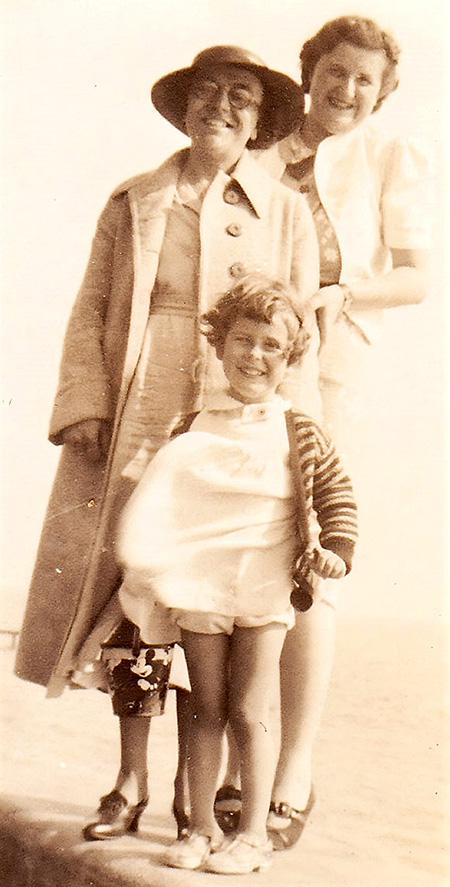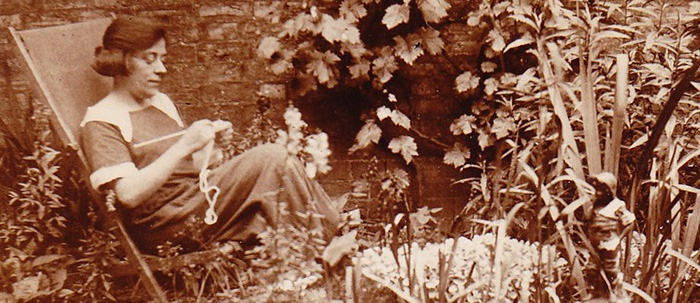
Rosie knitting a baby jacket in the Summer of 1920
Alfred. Family man
Once Alfred left the army in 1918, he spent nearly every day with his wife Rosie for the next forty years. The childhood sweethearts had been married for three years when they decided to adopt a child.
Interestingly, it was Rosie who took on the responsibility and signed the adoption papers with the NCAA.
Child adoption would have no legal status in the UK until 1926. Before then, child adoption was an informal, even secretive procedure. The adoptive parents had no rights and a biological parent could, and sometimes did, claim custody of their child many years' later.
After the War, money was tight, nearly a million British men had died in Europe with another million permanently wounded. Giving birth to a baby outside marriage, was still deeply disapproved of. If a family member did not step in to bring up a child, then a parent would go to one of the three agencies that had been set up in 1917 and 1918 to cope with a growing crisis.
Rosie and Alfred went to the National Children Adoption Association. They were vetted and fell for a baby girl born in February, called Marguerite O'Byrne. In October 1920, they were able to take her home. All the photos show that the couple were ecstatic with their new child, and they called her 'Joy'. They formally adopted her, years later, in 1938.
The 1920s and 1930s were profitable and happy ones for Alfred and Rosie. Photos of the time, show Rosie wearing stylish outfits and Alfred always made an effort to be dapper. That characteristic was to last to the end of his days. He was always seen with a tie on once he left his bedroom, and with a hat on when he stepped out. Even in the middle of the Depression era, it looks like there was still enough money for a holiday.
Bedford is about as far away from the coast as it is possible to be in England, nevertheless, the Goughs aimed to go to the seaside twice a year. They usually went to Pakefield, near Lowestoft, or Cliftonville, in Margate. And it wasn't just the three of them who went, they were often accompanied by Alfred's mother, Leah Gough, and Rosie's parents.
Alfred was always interested in new technology and gadgets. He had one of the first television sets in Bedford and I remember he had an early colour set in the 1970s so we were able to distinguish the different colour snooker balls on the table.
When the BBC started radio broadcasts in 1922, he made sure that his family could tune in. Alfred made his own crystal radio set and set it up in the living room. A crystal set is a simple radio receiver that needs no power source, the transmitted signal provides the necessary power to make it work. He sourced a wire aerial, made a copper earth, set up a coil and capacitor to make a tuned circuit. He bought some headphones that enabled one person at a time to listen to the broadcasts.
Alfred also liked taking photos. I don't think that he developed them himself but I remember an old box Brownie of his. The sepia picture of the adorable Joy with headphones alongside, was taken with another camera. She was 9 at the time and I have a poem, written for Joy's birthday by an elderly neighbour who used to look after her, that describes her feelings for Alfred:
"Do you know my Daddy, his name is Mr Gough? He's such a very quiet man, but Oh! He makes us laugh. He says the very drollest things and doesn't even smile. But there's a twinkle in his eyes all the while. He paints most lovely letters, and makes great big posters too. Some people say he's clever, and I really think it's true. But when I tell my Mummie "How I love him", she's so glad. And she says "He's the best Daddy a child ever had."
I must say that my brother and I didn't spot Alfred's drollery but then perhaps we came from a more cynical age. We did pick up on his musical abilities. He could play the tin whistle, the Jew's harp (aka mouth harp), the accordion and the piano, all by ear. He could not read music but could listen and pick out a tune and then play it back, pretty well note perfect. He didn't play much in front of us, but it was part of the Gough family fabric at home during the interwar years.
In the Spring of 1933, something incredible happened. Joy turned 13 and Rosie discovered she was pregnant! They were so sure that they could not have children naturally, that they had adopted. This came as a huge and welcome surprise to the forty-year olds. In September, Rosemary, our mother, was born.
Alfred Gough was born old. He looked 50 at 20, he really was an old head on young shoulders. His look didn't change throughout his life and he had his toothbrush moustache from his army days till he died. (Bizarrely, the undertakers shaved his tash off and so I had difficulty identifying him). He believed in doing the right thing, dressing appropriately, he hated confrontation and followed through with the Christian teaching, do to others as you would have them do to you.
Alfred was also a perfectionist. He would expect a thing to be done in a certain way and would look on disapprovingly if it wasn't. This means that you had to be very self-confident to pushback or ignore his expectations. Rosie, knew how to handle him and would tease him while also yielding and respecting him.
Alfred adored Rosie and nurtured his frequently ill wife. She got up late each day, suffered from headaches, dicky heart and a bad back. He loved his work and his small family. They could have survived being shipwrecked on a desert island, as he was so practical and they were so self-sufficient and used to entertaining themselves. They didn't go to the pub or the cinema but Alfred and Rosie were content during these inter-war years, they raise their two girls to be independent spirits.
The picture alongside though, was the last time that Rosie, Rosemary and Joy would be photographed together. This was 1939 and on Rosemary's sixth birthday, war was declared. Although Alfred, Rosie and Joy never left England, that would not save them from the tragedy that was to befall thousands of British families, including theirs.
